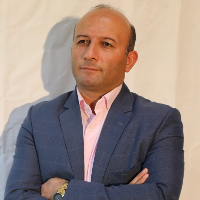Human papilloma virus infection in non-cancerous versus normal esophageal tissue samples by endoscopy
Author(s):
Abstract:
Background
Cancers are the second most common cause of non-accidental deaths in Iran, after cardiovascular mortality. Although most cases of esophageal squamous cell carcinoma (ESCC) in the USA and western populations have been attributed to high levels of exposure to tobacco and alcohol, but in Iranian populations the other risk factors especially infectious agents have been postulated as possible causes, particularly human papillomavirus (HPV). This study aimed to determine the prevalence and the types of HPV infection in biopsy samples taken from non-cancerous esophageal lesions during upper endoscopy. Methods
A total of 80 non-cancerous esophageal samples were collected in parafinnated blocks of tissue archives in pathology. After DNA extraction, qualitative PCR (qPCR) was performed using the HPV L1 primer pairs MY09/MY11 and then genotyping was performed in HPV DNA positive by Real time PCR. Results
From 80 cases, 29 (36.3%) were qPCR positive. Using the Real-time PCR method, a total of 14 HPV genotypes were assessed. We detected HPV-11 as a dominant type in this study and we did not find any type of HPV-16 and 18. Conclusion
In this study, HPV-II was the most common type in esophageal samples, in contrast we have found no oncogenic HPV like HPV 16 and 18 which are the most known responsible factors of ESCC in other countriesKeywords:
HPV (Human Papilloma virus) , esophagitis , normal tissue , non , cancer , Real , Time PCR
Language:
English
Published:
Caspian Journal of Internal Medicine, Volume:6 Issue: 1, Winter 2015
Pages:
9 to 14
https://magiran.com/p1342170
مقالات دیگری از این نویسنده (گان)
-
COVID-19 infection after vaccination
Mana Baziboroun, Sayareh Hosseinzadeh, Hemmat Gholinia, Farzin Sadeghi, *
Caspian Journal of Internal Medicine, Autumn 2024 -
EBV and HPV Infections in Colorectal Cancer and Their Effect on P53 and P16 Protein Expression
Arefeh Ebrahimian Shiadeh, Vahideh Hamidi Sofiani, Saghar Saber Amoli, Mahdie Taheri, Alijan Tabarraei, Hadi Razavi Nikoo, Farzin Sadeghi, Sorayya Khafri, Ghodsieh Kamrani, *, Abdolvahab Moradi
International Journal of Molecular and Cellular Medicine, Summer 2023



